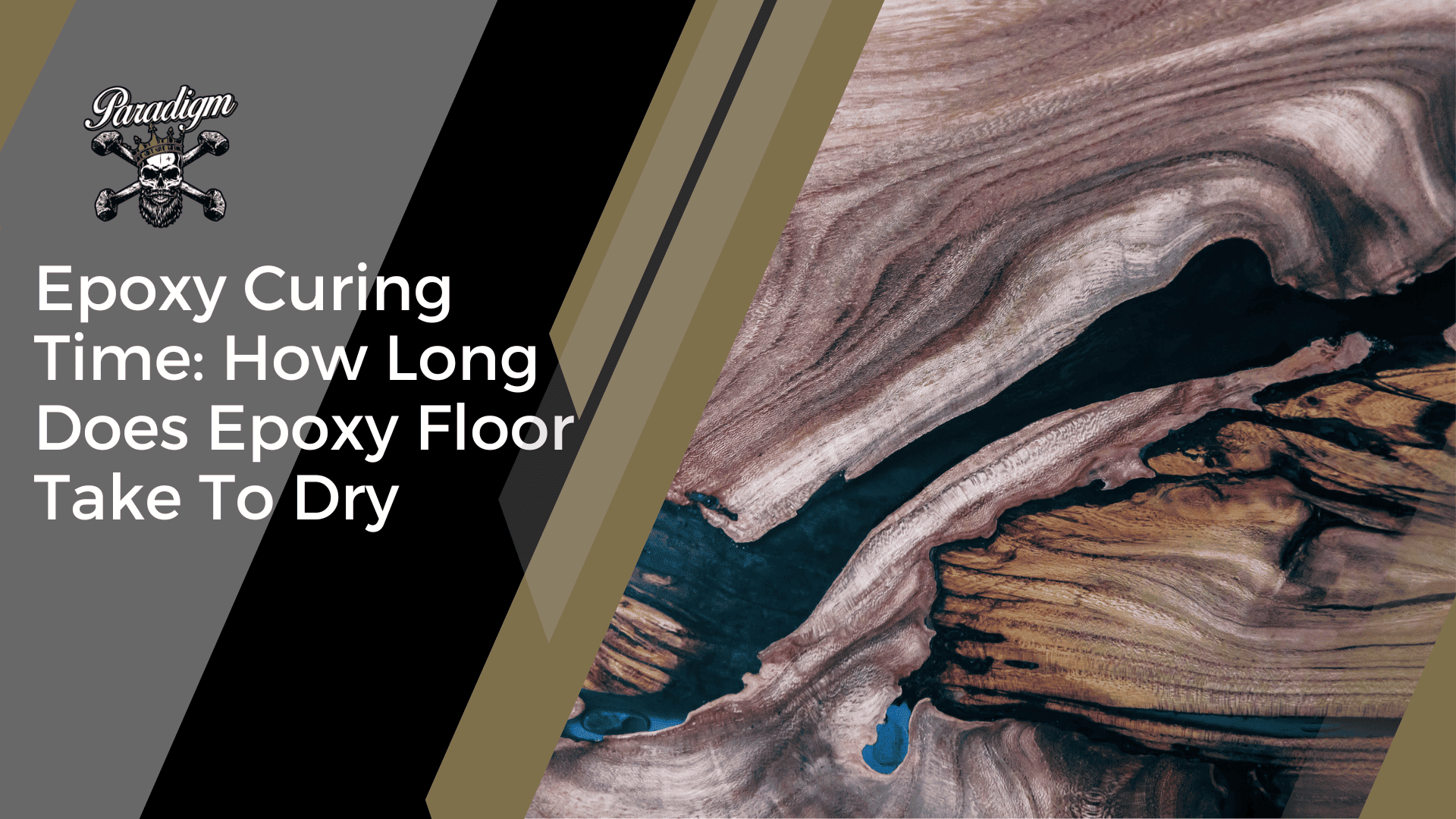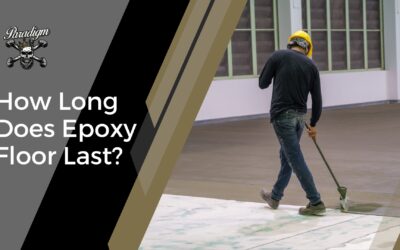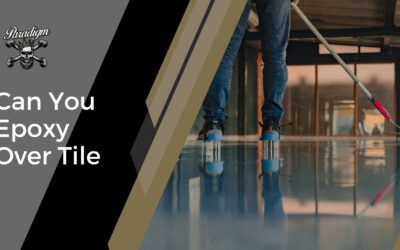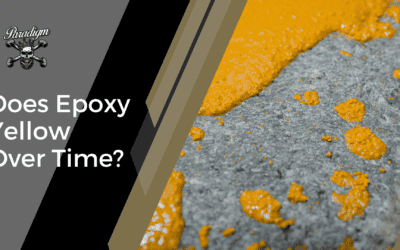Epoxy is a common choice for residential, commercial, and industrial spaces due to its exceptional durability and aesthetic versatility. It is a type of coating that is applied over concrete floors to create a glossy, seamless, and easy-to-maintain surface. When planning to install an epoxy floor, it’s crucial to consider not only its benefits but also a factor that often goes overlooked: the curing time.
Curing time refers to the duration it takes for the epoxy to fully harden and reach its optimal strength. It’s an essential consideration to ensure that your epoxy floor achieves its maximum durability and performance.
Table of Contents
How long does epoxy flooring take to cure?
The curing time of epoxy flooring can vary depending on several factors, including the type of epoxy used, temperature, humidity, and the thickness of the application. These factors play an important role in how quickly the epoxy floor hardens and reaches its optimal strength.
In terms of a general range, epoxy floors typically require 24 to 72 hours for a full cure. However, it’s important to note that this is a rough estimate and can vary depending on the specific epoxy product and the conditions in which it is applied. Some epoxies may cure faster, while others may require a longer curing period.
How long does epoxy take to dry on garage floors?
When it comes to epoxy flooring on garage floors, the drying time can be influenced by different factors. However, the things you should note include:
- Higher temperatures accelerate drying, while lower temperatures slow it down. Maintain a temperature range of around 60 to 90 degrees Fahrenheit (15 to 32 degrees Celsius) for optimal drying.
- High humidity levels can prolong drying time by impeding moisture evaporation. Choose a time for installation when humidity levels are below 85%.
- Proper airflow helps remove trapped moisture and aids in efficient drying.
Here are the general estimates for drying time:
1. Foot Traffic
Epoxy on garage floors typically dries to the point where it can handle foot traffic in approximately 12 to 24 hours. During this time, the surface should be able to withstand walking without leaving footprints or damaging the epoxy.
2. Vehicle Traffic
For vehicle traffic, it’s best to wait up to 72 hours before driving or parking vehicles on the epoxy floor. This extended drying time allows the epoxy to achieve a higher level of hardness and withstand the weight and movement of vehicles without compromising its integrity.
Always factor in the specific epoxy product, application thickness, manufacturer’s instructions, and environmental conditions in your garage when estimating drying time.
How to cure epoxy faster
Here are some tips and techniques to help accelerate the epoxy curing process:
1. Epoxy Accelerators
Consider using epoxy accelerators, which are additives specifically designed to speed up the curing time of epoxy. These accelerators promote faster chemical reactions, allowing the epoxy to cure more quickly. Follow the manufacturer’s instructions for the proper usage and dosage of the accelerator.
2. Apply Heat
Applying heat can help expedite the epoxy-curing process. You can use heat lamps, space heaters, or infrared heaters to raise the temperature of the environment. Be cautious and follow safety guidelines to prevent overheating or damaging the epoxy. Keep in mind that excessive heat can also lead to other issues, so it’s essential to find a balance and monitor the temperature carefully.
3. Ensure Proper Ventilation
Good ventilation is crucial for epoxy curing. It helps remove any volatile compounds and moisture released during the curing process, allowing the epoxy to dry faster. Open windows, use fans or employ exhaust systems to improve air circulation and facilitate the evaporation of moisture. However, be mindful of dust or debris that might be present in the air and take appropriate measures to minimize their impact on the curing epoxy.
4. Utilize Low-Humidity Environments
Epoxy cures faster in low-humidity environments. If possible, choose a time for epoxy installation when the humidity levels are relatively low. This can help prevent moisture from interfering with the curing process and promote faster drying. If the humidity is high, consider using dehumidifiers to reduce moisture in the surrounding air.
You should follow the manufacturer’s recommendations, monitor the curing progress closely, and allow sufficient time for the epoxy to cure properly. Patience and adherence to proper curing procedures will ensure the best possible outcome for your epoxy flooring project.
When can I walk on my new epoxy floor?
Generally, you should wait for at least 24 to 72 hours before allowing regular foot traffic on the epoxy floor. This time frame allows the epoxy to undergo the necessary chemical reactions and reach its optimal hardness and durability.
During this initial curing period, it’s crucial to avoid any heavy or sharp objects, dragging furniture, or any activities that could potentially damage the epoxy surface. Be cautious when moving objects or placing furniture back onto the floor to prevent any indentations or scratches.
Ensuring proper curing time is essential for achieving the desired hardness, durability, and performance of the epoxy floor. Rushing the process may compromise the integrity of the epoxy and result in suboptimal results. Therefore, it’s recommended to exercise patience and allow the epoxy floor ample time to cure before walking on it.
Will winter temperatures change the curing time?
Yes, winter temperatures can have an impact on the epoxy curing process. Colder temperatures generally slow down the curing time, potentially extending the overall drying and curing period compared to warmer conditions. This is because lower temperatures hinder the chemical reactions that occur within the epoxy, which are necessary for it to cure and harden.
When the ambient temperature drops, the chemical reactions in the epoxy mixture become less efficient, leading to a slower curing process. As a result, the epoxy may take longer to reach its optimal hardness and durability.
To solve this issue, there are a few suggestions you can consider:
1. Use Epoxy Formulations for Colder Temperatures
Some epoxy products are specifically formulated to cure at lower temperatures. These cold-weather epoxy formulations contain additives or modified chemical compositions that help facilitate curing even in colder environments. Check with your epoxy manufacturer for products that are suitable for lower-temperature applications.
2. Provide Additional Heat
Applying additional heat can help compensate for the colder temperatures and expedite the epoxy curing process. You can use portable heaters, heat lamps, or infrared heaters to raise the temperature in the area where the epoxy is being applied. It’s important to follow safety guidelines and manufacturer recommendations when using heat sources to avoid damaging the epoxy or causing safety hazards.
3. Control the Environment
If possible, try to create a controlled environment that is warmer during the epoxy curing process. Close off the area and use insulation, temporary barriers, or space heaters to maintain a more favorable temperature range. Additionally, ensure good ventilation to remove any excess moisture and maintain proper airflow.
Work with the best epoxy flooring company in Florida
Looking to transform your space with a stunning and long-lasting epoxy flooring solution? Look no further than Paradigm Concrete Finishes, the leading epoxy flooring contractor serving Sarasota, Pinellas County, and all of Florida.
At Paradigm Concrete Finishes, we specialize in providing beautiful and timeless epoxy flooring options that will enhance the aesthetics and functionality of your home or facility.
Paradigm Concrete Finishes not only offers exceptional epoxy flooring solutions but our team will help you understand the approximate timeline for the epoxy flooring to cure, ensuring that you have a clear understanding of what to expect during the installation process. We will provide recommendations based on your specific circumstances, taking into account factors such as environmental conditions and the type of epoxy being used.
Contact us today to start your epoxy flooring process!




